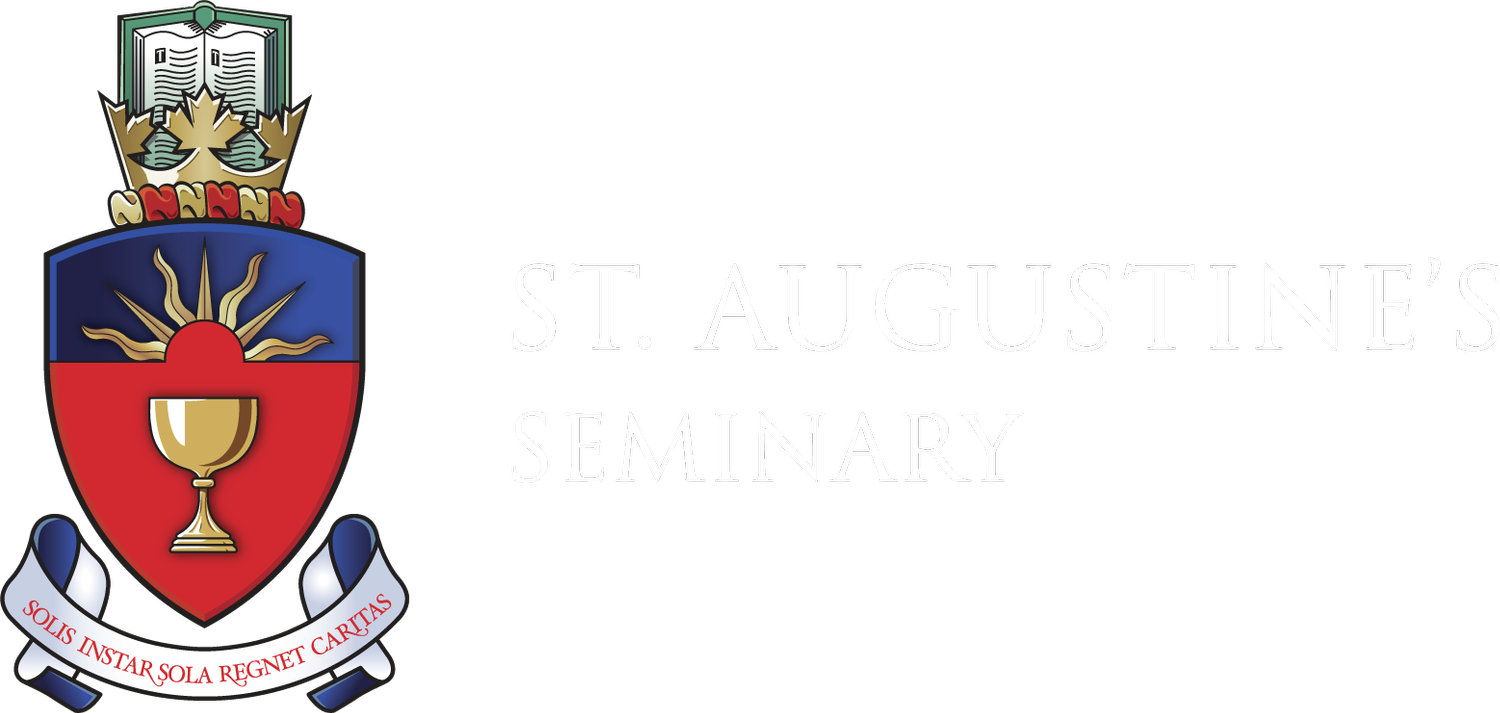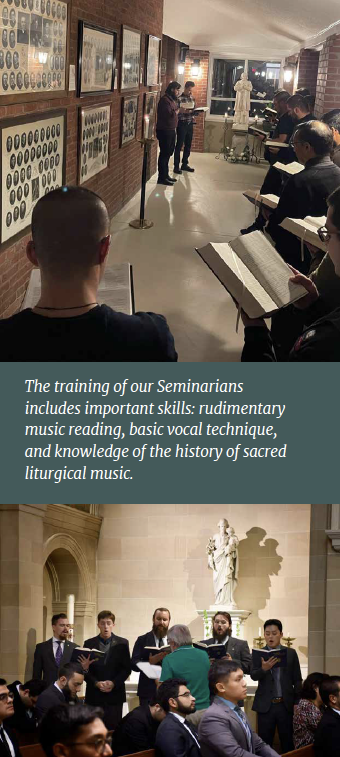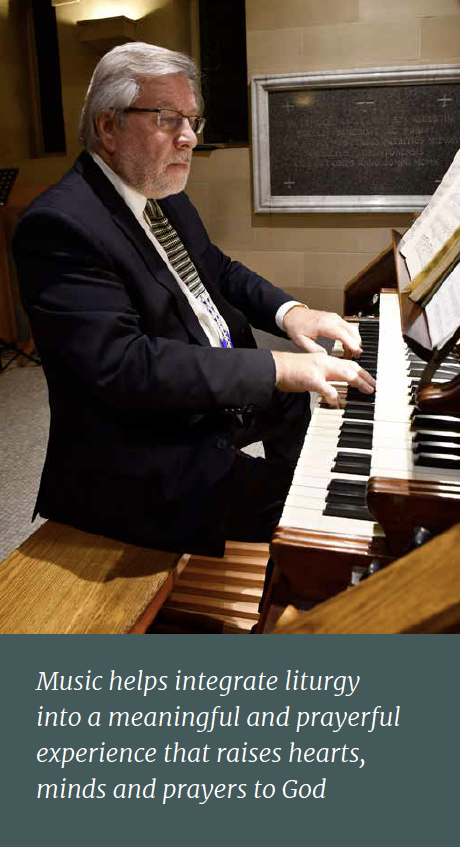The Importance of Sacred Music
Music has been an important part of liturgical celebrations from the earliest days of the Church. St. Paul instructs the faithful to “sing psalms, hymns and spiritual songs to God” with “gratitude in their hearts” (Col. 3:16). The General Instruction on the Roman Missal (Art. 39) quotes St. Augustine’s observation that: “Singing is for one who loves,” and goes on to cite the ancient proverb: “Whoever sings well prays twice over.” The Catechism of the Catholic Church speaks of the musical tradition of the universal Church as “a treasure of inestimable value, greater even than that of any other art.” (CCC, #1156)
In this article, we explore Sacred and Liturgical Music at the Seminary and the important role music plays in our community worship and the formation of our future Priests.
Every Sunday morning before the community Mass at the Seminary, St. Augustine’s Director of Liturgical Music Dr. Jerzy Cichocki leads Seminarians through chant practice. Seminarians then lend their voices in song as part of the Liturgical celebration.
“Music helps integrate liturgy into a meaningful and prayerful experience that raises hearts, minds and prayers to God,” Dr. Cichocki says. “Healey Willan, known as the dean of Canadian Church composers, described this relation very succinctly: ‘Music is the handmaid of the liturgy.’ That is to say that as our Seminarians participate in the liturgy every day that they are here, sacred music occupies a greater part of their interior life. Sacred music is a significant part of their formation as priests.”
Fr. Frederick Chung, Associate Professor of Biblical Theology (Old Testament) and Director of Propaedeutic Formation/Spiritual Year at St. Augustine’s, concurs with Dr. Cichocki’s assessment and stresses the importance of proper instruction in sacred and liturgical music.
“Music plays an important part in the formation of Seminarians and their personal prayer life,” he says. “Music and song engage the whole being: body, mind, and emotions. As bodily beings following our incarnate God, Jesus Christ, music keeps us grounded in our humanity while, at the same time, it raises our souls to great heights. I cannot conceive of a seminary, or a parish, without the sound of music resounding in the chapel during liturgies. Liturgical music is vital for our celebrations. I believe it is very important for Seminarians to be instructed in sacred music.”
As head of the Spiritual Year at the Seminary, Fr. Chung ensures Seminarians in their propaedeutic year also meet with Dr. Cichocki bi-weekly for a singing practicum.
“In the Old Testament, even before the Temple was built, we are told that David organized guilds of musicians and singers,” explains Fr. Chung. “The Psalms of the Bible are vestiges of liturgical music set to choir voices and musical instruments. Just read the ‘rubrics’ at the start of numerous Psalms and you will see.”
MUSIC NOT AN ADD-ON
“Liturgical music is actually part of the character of our sacred rites,” says Fr. John-Mark Missio, pastor of St. John’s Church in Toronto and former Director of St. Michael’s Choir School and Director of Liturgy and Vice-Rector of St. Augustine’s Seminary from 2012 to 2020. “When we put together all the things the Church says about liturgy and music, it becomes clear that the liturgy is inherently musical. Singing is not something adding to the liturgy like frosting on a cake. The liturgy is the cake, frosting and all.”
Keeping with the baking analogy, Fr. Missio, also a Sessional Lecturer at St. Augustine’s, says “formation in the Seminary has to train the liturgical taste-buds of the Seminarian to discern the rich flavours of Trinitarian worship in a broad diet, and only then can we in turn form the faithful in the way of beauty which is so much an inherent part of worship. Beyond the Seminary, priests will find themselves in places that might not have the resources to do grand music, but at least they will have been infused with an experiential, not only theoretical, knowledge of the inherent music character of Catholic Liturgy.”
While sacred and liturgical music are often used synonymously, Fr. Missio, who has had some of his own liturgical music published by Warner-Chappell and CanticaNova, says Seminarians are instructed on the subtle distinction.
“In formal liturgical discussions it is good to make a distinction for music that is suitable for the liturgy versus sacred music,” he explains. “Sacred music is a very broad category, within that liturgical music is a sub-category. Pope Pius X was the first to try to formally define sacred music so he wrote a Motu proprio in 1903, which is still often quoted. To distill and oversimplify his three characteristics of sacred music would be music which is holy, beautiful and universal. Those descriptive categories have been refined leading into Vatican II and beyond.”
Dr. Cichocki says Seminarians are given a broad education in music, both in theory and in practice.
“The training of our Seminarians includes important skills: rudimentary music reading, basic vocal technique, and knowledge of the history of sacred liturgical music. Another practical skill is learning to work with church musicians.”
Dr. Cichocki says Seminarians are also taught the importance and appropriateness of different pieces of music for different times of the year.
“The Lectionary and the Graduale Romanum dictate and inform different music selections for different cycles of readings,” he says. “The cycle for Sunday Liturgy follows a three-year program; weekday Liturgy has a two-year cycle. Each year our Seminarians learn the selections for that particular year.”
Seminarians also have weekly choir rehearsal, where they learn what they are going to be singing in the Liturgy that week. There is also a select group of Seminarians with a desire and perhaps stronger skill set in music, who join a smaller schola or Seminary choir.
But what if a Seminarian feels they just don’t have a good voice and can’t sing?
“Even if a Seminarian does not believe he has an aptitude for music, I would say that with some training they can take it up to another level, regardless of their natural talent,” says Fr. Chung.
“The Bible says ‘make a joyful noise unto the Lord’ (Psalm 100:1),” adds Fr. Missio. “When we all sing together in the liturgy, it’s not a performance. It is worship, and all voices are welcome in the ‘joyful noise’ of the people’s song.”



